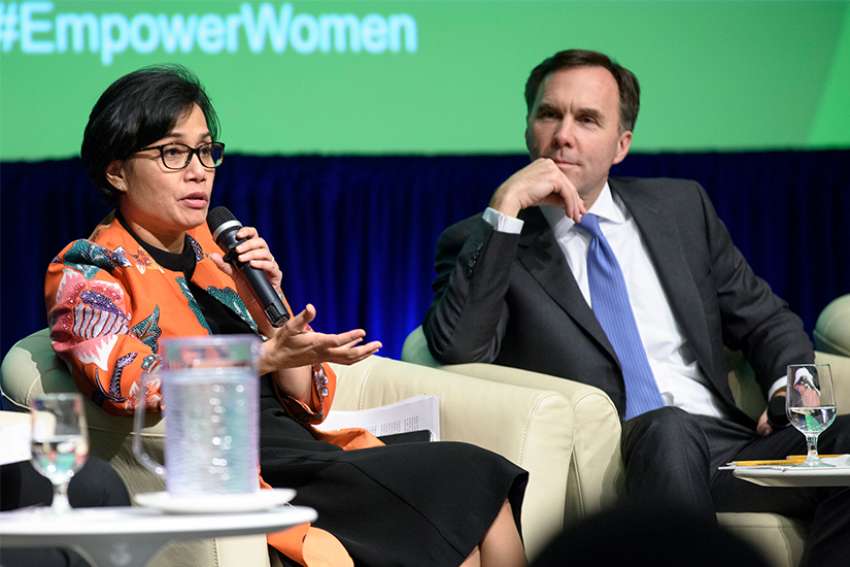Canada's Minister of Finance Bill Morneau at the IMF 2017 World Bank meeting on "Boosting Women's Economic Empowerment" in Washington, D.C., April 2017.
Photo by Clarissa Villondo/World Bank
Budget 2018: More cash, but Canada still missing foreign aid target
By Michael Swan, The Catholic Register
Canada is on track to fall even further behind other countries in doing its bit for the world’s most vulnerable populations, despite an extra $200 million injected into the 2018 foreign aid budget.
A little more money for international development aid is “always good news for Development and Peace and its partners in the global south,” Development and Peace advocacy and research program officer Marie-Sophie Villeneuve said after Finance Minister Bill Morneau laid out his government’s 2018 spending plans on Feb. 27.
But Villeneuve isn’t giving the government too much credit for the boost, which Morneau said is the start of an extra $2 billion in aid spending over five years.
By then, Canada will still be contributing just 0.26 per cent of its Gross National Income to support the poor on the planet, Development and Peace projects. That’s well below the 0.7 per cent target set by the United Nations.
“That puts us at fifth out of the seven countries in the G7,” Villeneuve said. “With the inflation rate, that will still keep us at 0.26 per cent.”
Villeneuve’s projection of status quo may be generous.
The budget’s own estimates show the economy growing an average of four per cent annually over the next five years, while the aid budget grows at two per cent per year. If the aid budget grows at half the rate of the economy, it’s hard to see how it will maintain 0.26 per cent of GNI.
It concerns Development and Peace that there’s no plan to get to the international target of 0.7 per cent of GNI. Other G7 countries — Germany and the United Kingdom — have hit the target over several years. Norway and Sweden frequently surpass 0.7 per cent. Canada now ranks 15th among Western donors.
It was Liberal Prime Minister Lester B. Pearson who first proposed the 0.7 per cent target in 1969.
In his budget speech, Morneau boasted the extra spending will “do more to help vulnerable people around the world by making the largest new investments in international assistance in more than a decade, including greater support for the world’s women and girls, through Canada’s Feminist International Assistance Policy.”
The details of the aid spending were deep inside a 369-page budget document titled “Equality + Growth: A Strong Middle Class.”
Development agencies like Development and Peace are looking at $14 billion over 10 years promised to the military and get the feeling they should be getting more.
“We don’t say we should not invest in our military. We know there is a need,” said Villeneuve. “The military business will become stronger while the peace organizations — we don’t invest enough in them.”
The feminist lens the Liberal government is putting on aid and development spending doesn’t bother Development and Peace. The $650 million the government threw at abortion advocates and providers around the world last year doesn’t stop the Catholic aid agency from accessing funding that will help women in Africa, Latin America and Asia in concrete ways, said Villeneuve.
“I don’t think it’s going to marginalize us. Having access to an abortion is not the only need a woman has,” she said.
Please support The Catholic Register
Unlike many media companies, The Catholic Register has never charged readers for access to the news and information on our website. We want to keep our award-winning journalism as widely available as possible. But we need your help.
For more than 125 years, The Register has been a trusted source of faith-based journalism. By making even a small donation you help ensure our future as an important voice in the Catholic Church. If you support the mission of Catholic journalism, please donate today. Thank you.
DONATE

